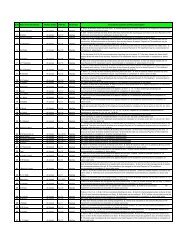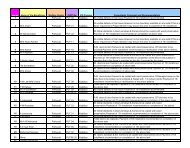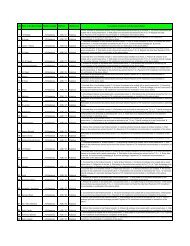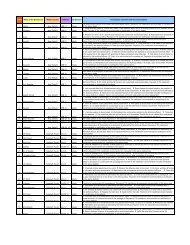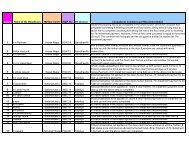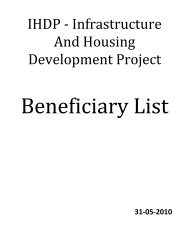UNHCR REPORT - 2006 - IHDP
UNHCR REPORT - 2006 - IHDP
UNHCR REPORT - 2006 - IHDP
You also want an ePaper? Increase the reach of your titles
YUMPU automatically turns print PDFs into web optimized ePapers that Google loves.
DRAFT – Not for Circulation<br />
The dramatic change in preferred durable solutions may be the result of the publicity<br />
surrounding the proposed World Bank housing project and misunderstandings regarding the<br />
purpose of the <strong>2006</strong> revalidation exercise in relation to the receipt of assistance under the<br />
proposed housing project.<br />
Of those wishing to integrate locally, 75% (11,118 families) possess land in Puttalam. Of<br />
these, 74% (8,281 families) have documentation to prove their land ownership. As noted<br />
above, the overwhelming number of IDPs who own land in Puttalam indicates that a majority<br />
of the Puttalam IDPs have de facto locally integrated. Given the relatively high number of<br />
families who possess land and have valid land documents, the 2004 report suggested that it<br />
might be warranted for the Government to review “who is still an IDP as many have<br />
registered but were already living in a relocation village and may have had a durable<br />
solution.” Similar conclusions may be drawn from an analysis of the <strong>2006</strong> survey data.<br />
It is important to note however, that local integration of the Puttalam WC population will<br />
need to be officially supported through Government assistance to facilitate land ownership,<br />
the acquisition of deed documentation and development assistance designed to improve<br />
physical infrastructure and access to public services such as medical and educational<br />
facilities. Without this assistance, sustainable integration will not be achieved. Moreover,<br />
voter registration in Puttalam District and the voting rights of the Puttalam IDPs will also<br />
need to be examined in order to ensure sustainable integration. IDPs should be provided with<br />
full information on their right to return, restitution and compensation, and while IDPs should<br />
be able to choose their place of residence in accordance with the fundamental rights<br />
guaranteed in the Sri Lankan Constitution, they should also be made aware of the<br />
implications of not being registered voters of Puttalam District. There should be some<br />
discussion of how to allocate sufficient resources to the DS of Puttalam to ensure equal<br />
access to public infrastructure and services.<br />
Interestingly, of those wishing to return to their place of origin, only 68% (371 families)<br />
possessed land, and only 23% (128 families) had documentation to prove their land rights. Of<br />
those wishing to return home, and who possessed land that was available (i.e. not in a HSZ or<br />
occupied by another), 78% (109 families) claimed to have documentation to prove their land<br />
rights. The fact of landlessness, compounded by lack of documentation, will pose significant<br />
obstacles to the return of these families.<br />
A relatively small number of families (116 or less than 1%) reported that some of their family<br />
members had returned to their district of origin. Of those families whose preferred solution<br />
was return home, 16 (3%) reported that they had family members who had already returned<br />
to their district of origin.<br />
Final Report on the <strong>2006</strong> Revalidation of the 2004 Puttalam WC Survey<br />
April <strong>2006</strong><br />
10



